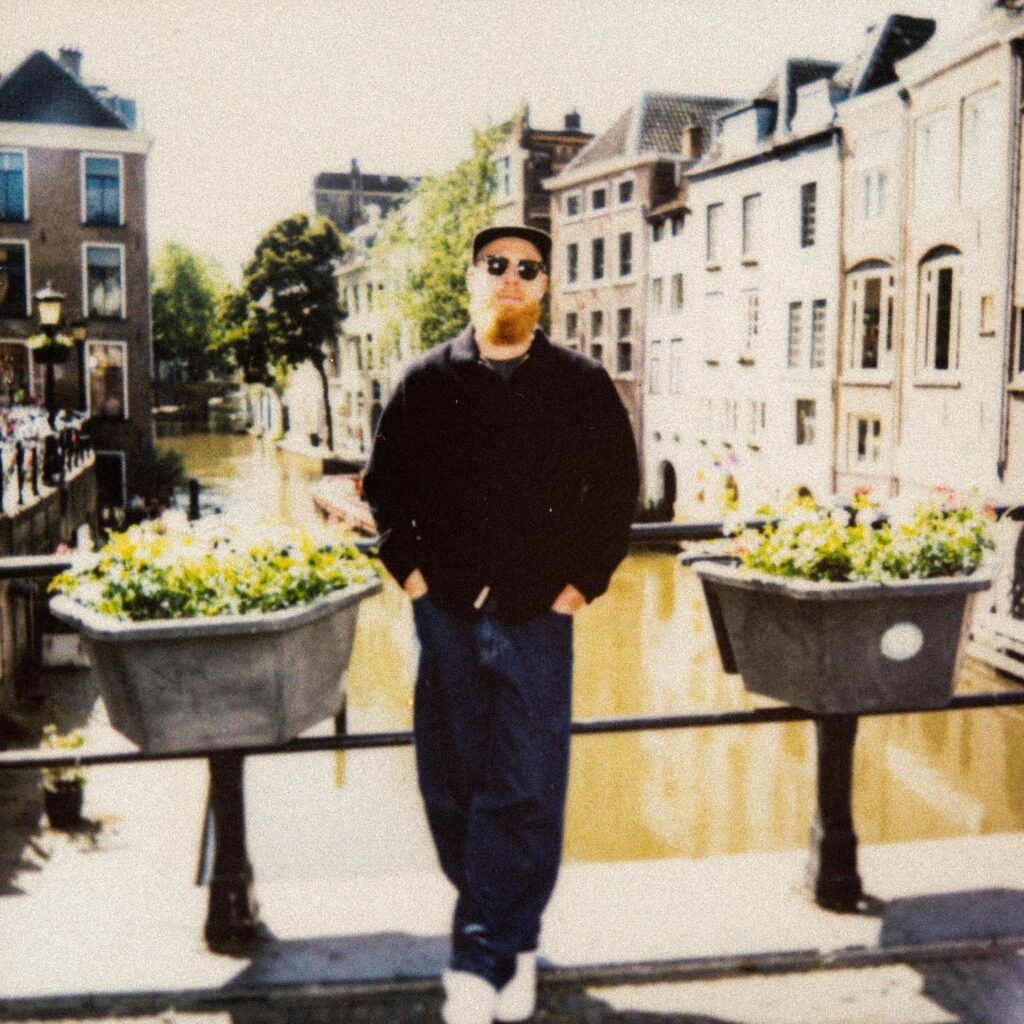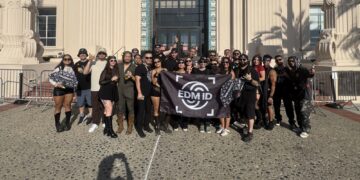Jordi van Achthoven steps into a more personal and introspective realm with his solo project, They Call Me Steve, and we sat down with him to talk about it.
Jordi van Achtoven has never been one to chase trends. As one-half of the renowned Dutch duo Tinlicker, he’s spent the last decade crafting emotionally resonant music that fills both dance floors and hearts worldwide. But behind the sold-out shows and chart-topping tracks lived another side of him quietly waiting to be heard. There was a deep longing to go inward, to create something raw, reflective, and deeply personal. This led to the birth of They Call Me Steve, a solo project that peels back the layers of his life to let the world in.
They Call Me Steve feels less like an alias and more like a blueprint into Jordi’s creative inner landscape. With his debut album, Escapism, on the horizon, he is finally sharing music that feels like a reawakening, with some tracks having lived solely on his hard drive for years. This LP is also deeply rooted in real life: fragments of fatherhood, sleepless nights on tour, revealing bike rides, heartbreak, and healing, all stitched together with warmth and vulnerability.
We had the opportunity to speak with Jordi about the wholesome journey to becoming They Call Me Steve. In this interview, he opens up about navigating two creative worlds, the therapeutic effects of making Escapism, and the joy of rediscovering his voice after years of collaborative success. This is for anyone who feels the pull to start again, not from scratch but from truth.
Listen to They Call Me Steve’s latest single, “Do You Think Of Me,” on Spotify or your preferred platform and read on for a deep dive into the creative mind of the Dutchman behind the music.
Hi Jordi! Thank you so much for chatting with us today. I want to begin by discussing Tinlicker’s remarkable success. When you look back over the last decade with Micha Heyboer, what feels the most surreal to you?
Hi there! I’ve been crafting and making music since 1996, and I somehow always knew that I would be making music and performing my songs on stage in the future. The Tinlicker project with Micha started in 2013. So, working for more than 10 years on a musical project to achieve something feels not surreal but justifiable to me. Maybe it’s also because I’m Dutch, we are very down to earth.
How has your understanding of success changed from Tinlicker’s beginning to now as you dive into this solo project?
Success is very personal. Success is not just having millions of streams on a certain song. Success for me is to keep it fun while I’m creating new music. To maintain a certain joy when I’m creating something new is the best. I remember that with the “Escapism” album, I had so much fun creating it, especially after so many years of creating music, and still being able to find that same joy I had when I started at 14 years old is everything to me. Thinking of performing live in the future scares me, though. All eyes on me… yikes.
How did creating They Call Me Steve allow you to express a different side of yourself that might not have resonated with the Tinlicker soundscape?
As one likes to create as an artist, I don’t want to feel limited in any way. Before I was doing Tinlicker, I made so many different types of music, from pop to alternative. I’ve been involved in creating albums for artists, and I ghost-produced music for a couple of acts. At the same time, I was soul-searching to find the sound I liked.
The Tinlicker soundscape also evolved quite a lot over the years. A lot of people would actually be quite surprised if they went back and listened to our first songs, and to be honest, I felt limited. People like Tinlicker because of a certain sound. They Call Me Steve was basically my outlet for doing something else.
Do you find that the creative process shifts depending on whether you’re working solo or collaboratively with Micha?
There are a lot of differences in these processes. I usually prefer to create things by myself. Mostly because it’s a personal outlet and matter. With Micha, we mostly finish songs in the studio. Of course, there are days when we produce something together. When I work solo, I don’t mind making something completely based on a piano, or a soundscape, or something at 112 bpm. That gives me more freedom. So having these two worlds is great because it’s a nice balance between the two.

The music on your upcoming album, Escapism, carries this pungent feeling of nostalgia and longing. Were you tapping into a memory or emotional chapter when diving into this album?
The album is very much about my personal life. Especially in 2024, which was a year I went through some personal stuff. Making the album was definitely therapy for me. I think I finally understood that it’s okay to be me. I accepted myself more than ever. I accepted my insecurities, my imperfections, my fears, my struggles in relationships, and my life as an artist and a father. Being an artist and a father is very different from what most of my friends around me experience.
I made some songs while we were on tour for Tinlicker. Spending five weeks on a tour bus makes me miss my daughter the most. An example is that while my daughter went to sleep in a 9-hour time zone difference, I was actually playing a sold-out show in Montreal. That made me feel very melancholic.
You’ve noted that some of the music on the album was made years ago, but it never got to see the light of day. How does it feel to finally share music that’s been sitting with you privately for so long? Was there a sense of vulnerability in letting it go?
Basically, I was too busy with the Tinlicker project. I made many ideas/songs over the years. I also made a lot of ideas with one of my closest friends, Thomas Helsloot. We once had this musical project called Majestique. So the best part was that I could sample my own music instead of ripping another 70s disco song. I think I knew back then that the shape of these songs wasn’t right, and what I learned from myself is that when a song doesn’t work while making it, I let go. I never delete songs, so sometimes, after ten years, I just click on old songs, and I find them more interesting than ever. This is also the case with a couple of songs from the album.
You describe this album as deeply personal, with samples of your real life scattered throughout. Can you share an example of a real-life sound bite that made it into a track?
Yes, I can. There are many hidden ones, but one obvious one is my daughter. She is a big part of this album. I somehow also feel like she co-wrote the album without knowing it. You can hear her in my forthcoming single, “Lara,” where she basically reads me a bedtime story instead of her reading me one. Basically, all the songs have background noises from the places where I made them. In the track “Sorry It Didn’t Work Out,” which will be part of the album release, you hear me cycling on my bike while I was getting the idea for the song.

The album is very versatile; It’s coffee shop chic meets club cabana. Was that contrast intentional, or did it happen more organically?
I usually don’t have an intentional idea in the beginning. First, I write the ideas down because that’s just a necessity. And then, after a couple of ideas, the ‘casing’ is missing. What I mean by that is the shape of the song or the song structure, and which sounds to use.
The idea to make it more like a ‘coffee shop’ came from when I was at home. That’s the place where I like to listen to certain music. A great example is Khruangbin, I’ve been listening to them since 2014. The music they make is so perfect to have on at home, in the background, while cooking, or having friends over, in the car…. It’s never annoying.
After that, I found out that I mostly created all the songs at home, and I tried to keep it a little bit like that. The music from Steve is something you can listen to at home, in the car, on the beach, in the park, at the pool (several friends already tried that), and of course, it’s something to dance to, but I wanted to maintain this ‘head nodding’ vibe.
What does escapism mean to you personally, and how did that sonically translate throughout the LP?
There are many things created in life by humans to get distracted from life itself. I believe that constant engagement with entertainment, whether it be sports, movies, or other forms of amusement, prevents self-understanding and hinders personal growth. For me personally, I’ve come to this understanding not so long ago. Producing music is basically also a form of escapism.
At the same time, creating new songs is like therapy for me. The truth is I find it hard to find a certain ‘life’ outside my music. I don’t find many entertainment things interesting or important at all. I don’t like to be around many people, I just like to be obsessed with creating music. Maybe I am feeding the entertainment or ‘escapism’ world with my album, but I hope people are aware of what they do to escape.
Finally, if someone listens to Escapism from start to finish with no context, what are the feelings or message you hope they come away with?
A real-life story with different kinds of emotions involved, like if they had a conversation with a good friend talking about life, inner self understanding, love, or the imperfection we are as humans. I hope that they had a good laugh and loved themselves. Oh, and not to forget, I hope these songs create a ‘lemon’ or a ‘bass’ face.
Follow They Call Me Steve:
Instagram | SoundCloud | YouTube | TikTok








